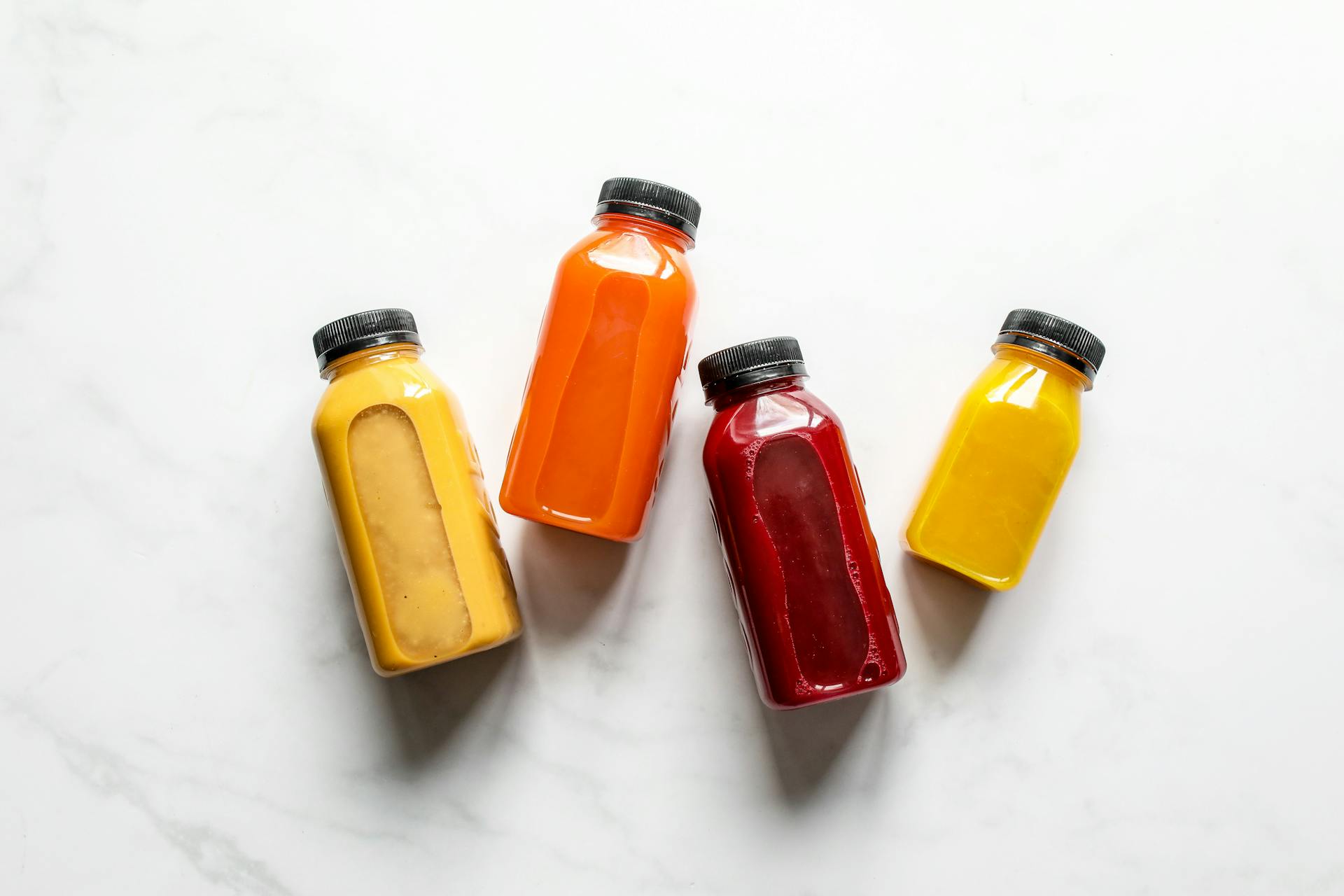
You've heard about probiotic foods and how they can restore beneficial bacteria in your digestive tract. Probiotics are known to help with GI issues like irritable bowel syndrome (IBS), including constipation, diarrhea, bloating, and more. While some people rely on a probiotic supplement to improve gut health, research shows that adding probiotic-fortified foods to your diet can also make things better for your gut bacteria.
It's pretty clear that having good gut bacteria is important for a healthy microbiome, mood, weight, and overall well-being. However, not all probiotic foods are created equal. The latest science suggests that some products marketed as healthy may actually be throwing your gut bacteria whack by adding bad gut bacteria instead of the good ones you need. A review published in the American Journal of Clinical Nutrition found that although probiotics have health benefits for people with GI issues in their early stages, not all brands provide adequate dosage or demonstrate benefits as companies promise based on their effects.
Discover Our Process for Evaluating Brands and Products
When it comes to probiotic foods, it's important to evaluate ingredients and health claims carefully. Our current body of scientific evidence suggests that adding probiotics to your diet can provide powerful benefits. Probiotics include sauerkraut, miso, tempeh, and live microorganisms called beneficial bacteria that provide health benefits. For example, consuming probiotics through yogurt has been shown to improve digestive health and reduce depression.
But the benefits don't stop there - evidence suggests that consuming probiotics can also promote heart health and better-looking skin. To ensure we're recommending super healthy options, we evaluate brands and products in supplement form as well as fermented foods like kimchi, kefir, and kombucha. When evaluating these 11 probiotic foods, we consider factors such as the quality of ingredients used in making them and how they are marketed to consumers.
Our process involves looking at the scientific evidence behind each product's health claims and weighing them against our own research findings. We also take into account customer reviews and feedback from other experts in the field. By doing so, we're able to provide you with a comprehensive evaluation of the best probiotic foods on the market today. So if you're looking to improve your gut health or experience any of the other amazing benefits of consuming probiotics, be sure to check out our recommendations!
Why Probiotic Foods Are Your Ticket to Incredible Health

Healthy probiotic foods are a great way to improve your overall health. This category includes numerous varieties of fermented foods, such as kimchi, sauerkraut, miso, and more. These foods provide beneficial bacteria that can help balance your gut microbiome and support digestion. Even if you're someone who won't eat some of the more traditional probiotic foods, there are still plenty of options available to you.
While some people turn to probiotic supplements online, it's important to remember that these products may not have the same powerful effects as whole food sources. Whole foods contain a variety of beneficial nutrients and compounds that work together to support your health. When you consume healthy probiotic foods regularly, you'll be providing your body with a diverse range of beneficial bacteria that can positively impact every aspect of your health.
If you're looking for an easy way to boost your health and well-being in 2022, consider adding more healthy probiotic foods to your diet. Whether you choose fermented soybeans, dairy products like kefir or yogurt, or other options like pickles or kombucha tea, there's sure to be something out there that will work for you. With so many benefits associated with this dietary approach - including improved immune function, better digestion and absorption of nutrients, and even enhanced mental clarity - it's no wonder that so many people are turning to healthy probiotic foods as their ticket to incredible health!
1. How we reviewed this article:
At [website name], we strive to bring you the most accurate and up-to-date information in the wellness space. For this article on probiotic foods, our team of experts continually monitor the latest research and trends in the field.
Before publishing, our article went through a rigorous review process. First, it was medically reviewed by Maya Feller MS, a registered dietitian and nutritionist with over a decade of experience in the field. Then, it was copy edited for clarity and accuracy by Chris Doka. The current version of this article reflects their contributions as well as the original authorship by John Bassham. We stand behind our commitment to providing trustworthy information to our readers, and we are proud to share this valuable resource with you. Be sure to check back for updates - our next review is scheduled for Feb 23 2023!
Unveiling the Mystery: Discovering What They Actually Are

Probiotic foods contain beneficial bacteria that play a central role in our gut microbiome. This collection of microorganisms plays an essential part in our immune function, and any disruption can result in various side effects, including digestive problems, skin issues, candida, autoimmune disease, and frequent colds. Historically, people maintained their gut health by eating fresh foods grown in good soil or fermenting foods to preserve them for longer. However, dangerous agricultural practices and decreased diet quality have significantly lowered the number of good bacteria found in foods today.
Consuming probiotic foods has numerous health benefits, such as a stronger immune system, improved digestion, increased energy, and vitamin B12 production. Probiotics can even destroy candida and lead to healthier skin while improving eczema symptoms. Moreover, probiotics can help reduce colds and prevent leaky gut syndrome and inflammatory bowel disease. Weight management is another potential benefit of consuming probiotic foods. Sound good? Start consuming probiotic foods daily to support your gut health ideally.
There are several ways to pick probiotic foods from a prebiotic food list and start filling your diet with friendly gut bacteria. Here are the top seven types of probiotic bacteria: Lactobacillus acidophilus, Lactobacillus bulgarius, Lactobacillus reuteri, Streptococcus thermophilus, Saccharomyces boulardii, Bifidobacterium bifidum, and Bacillus subtilis. It's essential to note that probiotics naturally contain active cultures - it's important they're live! Probiotic supplements make it easy to consume enough beneficial bacteria each day if you're not able to eat enough related kefir or other fermented foods.
How to Get More Probiotics Into Your Diet
Incorporating probiotic-rich foods into your daily diet is an excellent way of improving your gut microbiome. You'll find a wide range of options, from simple swaps like substituting soda, juice, or energy drinks with fermented beverages. Trade regular yogurt for probiotic yogurt or substitute raw milk for regular cheese and other milk products.
Probiotic foods can easily be added to your favorite recipes to give them extra flavor while boosting their nutritional value. Consider adding weekly rotation tempeh works as a meatless main dish or sauerkraut as a savory spread on sandwiches. Apple cider vinegar makes a great addition to salad dressings, providing you with a daily dose of natural probiotic foods.
Including more probiotic-rich foods in your meals can make healthy eating more enjoyable and help you create delicious meals that are good for you. Don't forget about related probiotic drink benefits; incorporating these into your routine can further enhance the positive effects that probiotics have on your overall health.
1. Atkins Diet: How It Works, Health Benefits, Plus Precautions
The Atkins Diet is a low-carbohydrate, high-fat diet that aims to help people lose weight. It works by putting the body into a state of ketosis, where it burns fat for energy instead of glucose. This process can lead to rapid weight loss in the short-term. However, the long-term health benefits of the Atkins Diet are still up for debate.
One potential benefit of the Atkins Diet is that it may improve heart health by lowering LDL (bad) cholesterol levels and increasing HDL (good) cholesterol levels. Additionally, some studies have shown that low-carbohydrate diets like Atkins may be more effective at reducing blood sugar levels and improving insulin sensitivity than traditional low-fat diets. However, there are also concerns about the potential risks of consuming high amounts of saturated fat on this diet, as well as its impact on gut health and overall nutrient intake. As with any diet, it's important to speak with a healthcare professional before starting the Atkins Diet and to monitor your health closely throughout your journey.
Frequently Asked Questions
Are probiotics the be-all and end-all?
No, probiotics are not the be-all and end-all. While they have shown to have some health benefits, they should not be relied upon solely for optimal health. A well-balanced diet and lifestyle factors also play important roles in overall wellness.
How to improve gut health with natural probiotics?
Consuming foods rich in probiotics, such as yogurt, kefir, sauerkraut, and kimchi, can improve gut health naturally by increasing the number of beneficial bacteria in the gut microbiome.
What are the best supplements for gut health?
Probiotics, prebiotics, and digestive enzymes are the best supplements for gut health as they promote a healthy balance of gut bacteria, improve digestion, and reduce inflammation.
Are probiotics shelf stable?
Yes, some probiotics are shelf-stable and do not require refrigeration. However, it's important to read the label and follow storage instructions to ensure the potency of the probiotics.
Are probiotic supplements for your gut really good for You?
Yes, probiotic supplements can be beneficial for digestive health by promoting a healthy balance of bacteria in the gut, but it's important to choose the right strain and dosage for your specific needs. Consult with a healthcare professional before starting any new supplement regimen.
Featured Images: pexels.com


